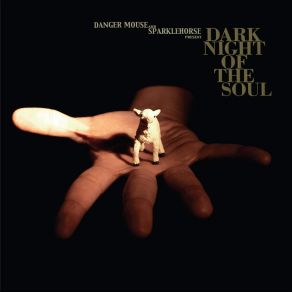Dark Night of the Soul
Download links and information about Dark Night of the Soul by Danger Mouse And Sparklehorse. This album was released in 2010 and it belongs to Hip Hop/R&B, Rap, Rock, Country, Alternative Country, Alternative genres. It contains 13 tracks with total duration of 45:47 minutes.

|
|
|---|---|
| Artist: | Danger Mouse And Sparklehorse |
| Release date: | 2010 |
| Genre: | Hip Hop/R&B, Rap, Rock, Country, Alternative Country, Alternative |
| Tracks: | 13 |
| Duration: | 45:47 |
| Buy it NOW at: | |
| Buy on iTunes $9.99 | |
| Buy on Amazon $21.84 | |
Tracks
[Edit]| No. | Title | Length |
|---|---|---|
| 1. | Revenge (Feat. The Flaming Lips) | 4:54 |
| 2. | Just War (Feat. Gruff Rhys) | 3:44 |
| 3. | Jaykub (Feat. Jason Lytle) | 3:52 |
| 4. | Little Girl (Feat. Julian Casablancas) | 4:32 |
| 5. | Angel's Harp (Feat. Black Francis) | 2:55 |
| 6. | Pain (Feat. Iggy Pop) | 2:51 |
| 7. | Star Eyes (I Can't Catch It) [Feat. David Lynch] | 3:10 |
| 8. | Everytime I'm With You (Feat. Jason Lytle) | 3:11 |
| 9. | Insane Lullaby (Feat. James Mercer) | 3:10 |
| 10. | Daddy's Gone (Feat. Mark Linkous & Nina Persson) | 3:08 |
| 11. | The Man Who Played God (Feat. Suzanne Vega) | 3:09 |
| 12. | Grim Augury (Feat. Vic Chesnutt) | 2:31 |
| 13. | Dark Night of the Soul (Feat. David Lynch) | 4:40 |
Details
[Edit]A year of legal arguments delayed the release of this album and in the interim both Sparklehorse’s Mark Linkous and vocal guest Vic Chesnutt committed suicide. The title takes on a greater and darker meaning, not that this was ever an easy collection. Film director David Lynch contributed two vocal tracks and the rest of the cast is an elite line-up of musical personalities who bring much of themselves to the tracks. Danger Mouse (Brian Burton) and Linkous constructed haunted houses for their guests to explore. The Flaming Lips’ Wayne Coyne turns in his spacey vocal take for “Revenge.” Grandaddy’s Jason Lytle offers his weightless meditation on “Everytime I’m With You.” Iggy Pop turns up the punk bravado for “Pain.” Linkous and the Cardigans’ Nina Persson bring forth a joyous pop atmosphere for “Daddy’s Gone” that gently hides the real terror. Suzanne Vega proves her great flexibility with the comfortably modern “The Man Who Played God.” But it’s Chesnutt who brings the album’s most chilling moment with “Grim Augury,” where his wracked voice dredges up all the pain he carried in life.